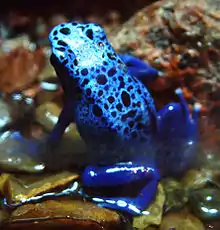Neobatrachia
The Neobatrachia (New Latin neo- ("new") + batrachia ("frogs")) are a suborder of the Anura, the order of frogs and toads.
| Neobatrachians | |
|---|---|
 | |
| Dendrobates tinctorius "azureus" | |
| Scientific classification | |
| Kingdom: | Animalia |
| Phylum: | Chordata |
| Class: | Amphibia |
| Order: | Anura |
| Suborder: | Neobatrachia Reig, 1958 |
| Superfamilies | |
|
Bufonoidea | |
This suborder is the most advanced and apomorphic of the three anuran suborders alive today, hence its name, which literally means "new frogs" (from the hellenic words neo, meaning "new" and batrachia, meaning "frogs"). It is also by far the largest of the three; its more than 5,000 different species make up over 96% of all living anurans.
The differentiation between Archaeobatrachia, Mesobatrachia, and Neobatrachia is based primarily on anatomic differences, especially the skeletal structure, as well as several visible characteristics and behaviors.
Systematics
Separating the Anura into the Archaeo-, Meso- and Neobatrachia is somewhat controversial; as more research is done and more knowledge is gained, it is becoming even less clear, because many characteristics used for this differentiation apply to more than one group.
Neobatrachia are usually sorted into five superfamilies, but this division is also controversial, as some families are placed into different superfamilies by different authors. In addition, several families have been revealed to be paraphyletic and consequently split up to make them correspond to clades and thus be natural, evolutionary groups. This has approximately doubled the number of presently recognized neobatrachian families.
List of families
The families currently accepted in the Neobatrachia by many authors are:
- Amphignathodontidae – marsupial frogs (sometimes in Hemiphractidae)
- Aromobatidae – skunk frog (sometimes in Dendrobatidae)
- Arthroleptidae – squeakers
- Brachycephalidae – saddleback toads
- Bufonidae – true toads
- Calyptocephalellidae (sometimes in Bufonidae)
- Centrolenidae – glass frogs (including Allophrynidae)
- Ceratophryidae
- Craugastoridae Hedges, Duellmann & Heinicke, 2008 (formerly in Brachycephalidae)
- Dendrobatidae – poison dart frogs
- Eleutherodactylidae Lutz, 1954 (formerly in Brachycephalidae)
- Heleophrynidae – ghost frogs
- Hemiphractidae
- Hemisotidae – shovelnose frogs
- Hylidae – true tree frogs and relatives (including Cryptobatrachidae, Hemiphractidae)
- Hylodidae
- Hyperoliidae – sedge frogs, "bush frogs"
- Leiuperidae (sometimes in Leptodactylidae)
- Leptodactylidae – southern frogs, tropical frogs (including Cycloramphidae)
- Mantellidae – Malagasy frogs
- Microhylidae – narrow-mouthed frogs (including Brevicipitidae)
- Myobatrachidae (including Limnodynastidae, Rheobatrachidae)
- Petropedetidae - African torrent frogs
- Pseudidae - swimming frogs
- Pyxicephalidae
- Ranidae – true frogs (including Ceratobatrachidae, Dicroglossidae, Micrixalidae, Nyctibatrachidae, Petropedetidae, Phrynobatrachidae, Ptychadenidae, Pyxicephalidae)
- Ranixalidae (sometimes in Ranidae)
- Rhacophoridae – shrub frogs, "bush frogs", "moss frogs"
- Rhinodermatidae – Darwin's frogs (sometimes in Cycloramphidae)
- Sooglossidae – Seychelles frogs and purple frog (including Nasikabatrachidae)
- Strabomantidae Hedges, Duellmann & Heinicke, 2008 (some formerly in Brachycephalidae)
References
- "Fossilworks: Neobatrachia". PaleoBiology Database. paleodb.org.
| Wikimedia Commons has media related to Neobatrachia. |
Further reading
- Gissi, Carmela; Diego San Mauro; Graziano Pesole; Rafael Zardoya (February 2006). "Mitochondrial phylogeny of Anura (Amphibia): A case study of congruent phylogenetic reconstruction using amino acid and nucleotide characters". Gene. 366 (2): 228–237. doi:10.1016/j.gene.2005.07.034. PMID 16307849.
- Hoegg, Simone; Miguel Vences; Henner Brinkmann; Axel Meyer (July 2004). "Phylogeny and comparative substitution rates of frogs inferred from sequences of three nuclear genes". Molecular Biology and Evolution. 21 (7): 1188–1200. doi:10.1093/molbev/msh081. PMID 14963093.
- San Mauro, Diego; Miguel Vences; Marina Alcobendas; Rafael Zardoya; Axel Meyer (May 2005). "Initial diversification of living amphibians predated the breakup of Pangaea" (PDF). American Naturalist. 165 (5): 590–599. doi:10.1086/429523. PMID 15795855.
